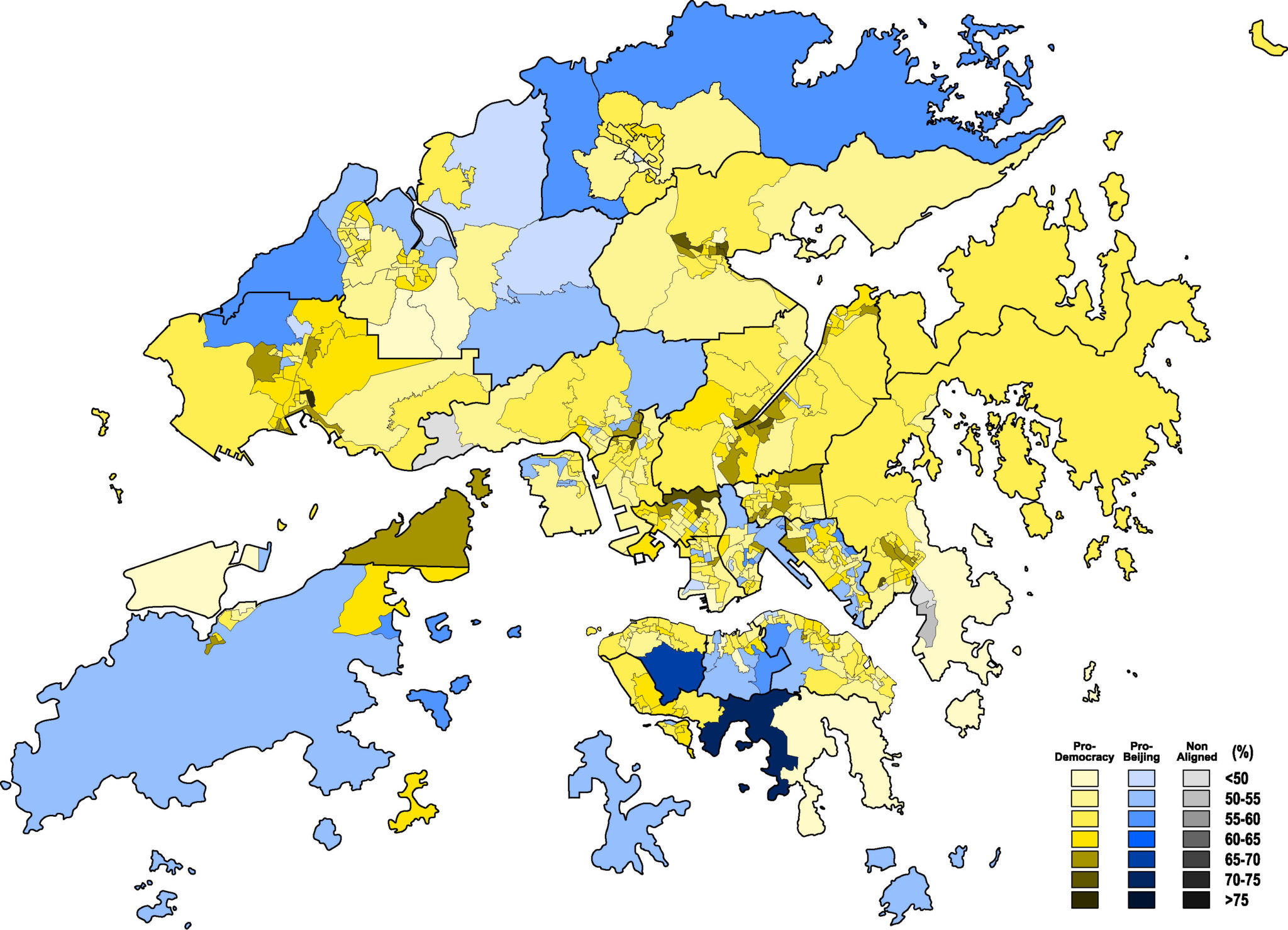
Wikimedia Commons
Weeks following Hong Kong’s District Council elections that yielded a landslide victory for the pan-democracy camp, Yale professors and students familiar with the territory are discussing what effect it will have.
On Nov. 24, Hong Kongers went to the polls to elect District Councillors, who are the lowest level of elected officials who oversee small communities in the city. With a turnout rate of more than 71 percent, the city overwhelmingly supported the pan-democrats, with their camp winning 389 of 452 elected seats. Prior to this election, the pan-democrats only held 124. While the margin of victory was stunning, Yale affiliates interviewed by the News said they were not surprised that the pan-democrats clinched the majority given the widespread civil unrest in the city in recent months.
“The election results were no surprise,” said Jackson Senior Fellow and China expert Stephen Roach. “The demonstrations have been unprecedentedly dramatic in terms of the intensity of feelings, breadth of support and strong sentiments at the grassroots … that the current government is not performing in a satisfactory way. The impact is symbolic in that it doesn’t really imply that something radically new is going to happen, but it underscores the deeply held clash of ideologies that is at the core of this dispute.”
Many have viewed this result as a referendum on the Hong Kong government’s handling of the recent protests against Beijing’s encroachment on the city. Formerly a British colony, Hong Kong was handed over to China in 1997 and has functioned semi-autonomously under a system known as “one party, two systems.” However, in recent years, Beijing has tightened its grip on the city. This most recent iteration of protests was sparked after a controversial extradition bill was put forward in the governing Legislative Council. Though the bill has been suspended, the protests have continued, and thousands of people — mainly students — have been arrested.
“Some would say the results were a vote of confidence for the protestors, but I would say it’s more of a vote of un-confidence in [Hong Kong’s Chief Executive] Carrie Lam,” said Ariq Hatibie ’20, a Yale undergraduate from Hong Kong. “I think, regardless of if people support the protestors, what [Hong Kongers] were thinking was that Carrie Lam simply just didn’t handle the situation very well and her government just didn’t do very much. People were thinking that they needed a sea change in Hong Kong politics and that starts with the District Councils.”
Still, pro-democracy activist and former Hong Kong lawmaker Nathan Law GRD ’20 argued that the result is more than symbolic. He explained that though the District Councils do not possess a lot of power beyond governing day-to-day affairs — like managing budgets and infrastructure — the pro-Beijing dominated Legislative Council now has to work with pro-democracy local councils. He also noted that District Councillors get to nominate a single member to sit on the 70-person Legislative Council and have 117 of the 1200 seats on the Chief Executive Election Committee.
“This situation will have an impact on politics,” said Law, who remains a controversial figure in China.
Further complicating the issue is increasing American support for the protestors and democracy movement in Hong Kong. On Nov. 27, President Trump signed into law the Hong Kong Human Rights and Democracy Act with near-unanimous support from Congress. This law requires that the State Department complete an annual review of Hong Kong’s status and requires the Government to impose sanctions against officials responsible for human rights abuses in Hong Kong. This is even further complicated by the ongoing negotiations for a US-China trade deal.
“[The results] have a significant impact on both Beijing and Washington,” said Roach. “In terms of Beijing, it’s a strong endorsement of a stance that runs against the very grain of leadership that Beijing feels that it continues to control, so this is a rejection of that. From the standpoint of the US, it obviously is a source of great encouragement to the anti-China faction, which is quite large in both the Republican and Democratic parties of Congress, and, I think it resonates with the [Hong Kong] Human Rights and Democracy Act that was just signed into law.”
Roach said that, with the trade talks looming over the issue, he is doubtful that the United States will take further steps to support the protestors. He said, that the question now becomes what pro-democracy Hong Kongers will be able to do with this momentum.
“Autonomy and democracy are the things people on the streets are hoping for,” Law said. “Preserving our way of life. Preserving our culture. Not having to worry about whether our language will be wiped out. These are all very terrifying issues.”
On Nov. 27, Lam assured the people that her government would respect the results of the election, noting that the government would “seriously reflect” on the issues that brought voters out to the polls.
Hong Kong was transferred from the United Kingdom to China in 1997 and promised the right to self-governance for the first 50 years.
Kate Pundyk | kate.pundyk@yale.edu
Claire Fang | claire.fang@yale.edu







